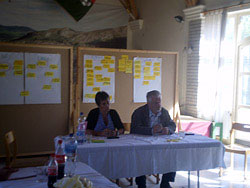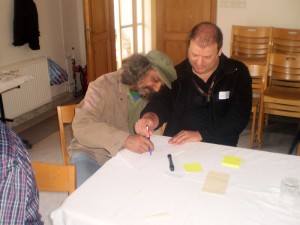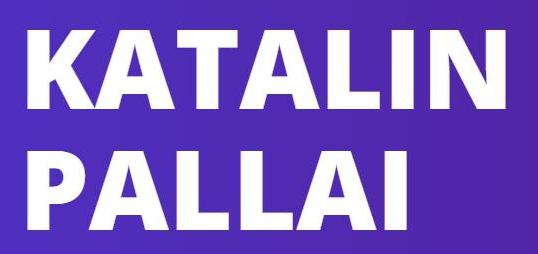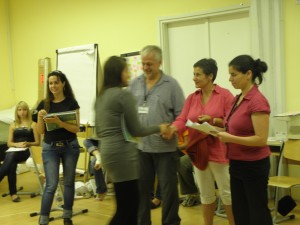Multi-stakeholder Alternative Dispute Resolution Processes.
guest professor, National Public Service University, since 2011
The course offers an introduction to multiparty disputes. It shows how can be alternative dispute resolution methods applied in multi-stakeholder processes, how can representation be organized, and how can collaborative problem solving and conflict resolution processes facilitated and led to sound and sustainable solutions. The course presents the theoretical underpinnings to both multi-stakeholder processes and conflict resolution, involves participants in various exercises and practical challenges, and initiates in depth discussion on professionally and politically correct process design and facilitation. The course is presented for MA level in English and parts of it are also presented in Hungarian in the frame of post-graduate education.
Accredited Mediator Training.
Course designer and trainer, Scientific University of Szeged 2012 The training offers a curriculum for mediators that covers the full range of subjects required for their licensing in Hungary. It is a training whose successful accomplishment is automatically accepted by the Ministry of Justice as the fulfillment of training requirement for mediators. It consist of 60 training hours and practicum. I developed and lead it with one colleague.
Alternative Dispute Resolution in Schools
Mentor mediator, Education Research and Development Institute, 2011
I worked in the frame of the multi year project “Alternative Dispute Resolution: the introduction of interest-based and restorative processes in schools.” My duties were the following: advice on project development, process management and professional decisions of the project management, support of teachers and mediators trained by the project to start practice (mentoring, case discussion and analysis, co-mediation supervision) Planning and leading activities in schools that support the introduction of AVR approaches in school activities, routines and procedures.
Public participation in multi-ethnic local governments
Research and course manual writing. LGI/Open Society Institute, 2011
In jurisdictions where different ethnic groups share a place where they live, and the conceptualization of some local affairs is differentiated along ethnic lines some degree of conflict is among stakeholder values, desires expectations and perceptions is part of life. In such an environment participation of stakeholders in the policy process is essential to building sustainable and just local societies. The manual discusses how public participation can be designed and managed in multi-ethnic contexts in a manner that it can support the agreement on and implementation of the policy goals. The manual presents the key terms and concepts and the most important body of practical knowledge on local public participation, and examines the specific consequences of the multi-ethnic environment on the design and implementation of participatory mechanisms.
Built heritage in local governance
Distance learning course development. ISES (In-stitute for European and Social Studies), 2011
Distance learning course in the frame of the post graduate Cultural Heritage Management Program of the Institute for Social & European Studies (ISES) and Corvinus University, Budapest. The purpose of the course is to discuss the implications of heritage and conservation practices to the local context, with focus on the conflict among different inetrpretations of heritage and between development and protection and its social and political dimensions, and to discuss deliberative democratic processes that can support the heritage management. Key themes are the role of heritage in place making and the negotiations related to heritage within the local political community. By the end of the course students become able to recognize the possibilities that different participatory mechanisms can offer for the negotiation and collaboration of stakeholders, and with this knowledge and skills they will improve their capacity to engage in effective and collaborative negotiation with other stakeholders about the local built heritage.
Mediation: Conflict management and resolution
Course designer and trainer, Academy for Mayors, 2009-2011
The Academy for Mayors was established by the Corvinus University and the Association of Hungarian Local governments with the support offered by the Norwegian bilateral funds. Within the frame of the Academy Mayors a one year long post graduate education is offered for the elected decision makers. During the first year of the program I was commissioned (with a colleague) to elaborate a module on the management of conflicts related to local issues and inter-municipal disputes. The tasks were the preparation of a textbook for the participants and a teaching method for conflict resolution. The module was based on experience-based training technique. Its components included, practical exercises, skill building elements, case study analysis, discussions and short conceptual and knowledge components. After the success of the course during the first year, we recieved an invitation for an extended version for the second year.
Mentoring Municipalities in Roma Education
Lead expert in training design and trainer of trainers, Open So-ciety Insti-tute and Roma Education Fund, 2010
The Roma Education Fund supports the DILS project whose goal is to support local governments and stakeholders in developing and implementing an integrated enrollment policy and system support for the successful education of Roma children – from the preparatory pre-school education onwards – incorporated in the Local Action Plans for Roma education. One component of the program was to train Mentors to work with local governments and support the elaboration and implementation of integration strategies and policies. My role was to supervise the design and elaboration of the materials for the training of the mentors, and to train the Serbian speaking trainers who were commissioned with the training of mentors.
Resolution of local conflict caused by regulatory changes.
Mediator, 2009-2010
The local government initiated the conflict resolution process in a prospering medium size Hungarian city where the rezoning of a housing area had triggered violent opposition of various civil soci-ety groups. The process we led conveyed all stakeholders involved or affected by the conflict. We assisted the stakeholder groups to organize their effective representation and mediated the negotiation process that led to partial agreements. As a result of these agreements the stakeholders could define the scope of information gathering and analysis needed for a final agreement, expected to be discussed in a couple of months.
Community mediation in Csobánka
Mediator, IRM, Hungary, 2009
 Csobánka is a multi-ethnic settlement in the agglomeration of Budapest with approx. 3.000 inhabitants and five ethnic groups. In Csobánka cohabitation was peaceful till the 1990s. The settlement had one school attended by all ethnic groups. In the 1990s people from Budapest started to settle in the town situated in a beautiful natural setting. By today the size of the town has tripled with the new comers, but community life has disintegrated and the local school became completely segregated (attended only by Roma children). The mediation assisted the community to create constructive dialogue in order to desegregate the school, revive community life and relations, and establish the institution that can maintain the dialogue established during the project.
Csobánka is a multi-ethnic settlement in the agglomeration of Budapest with approx. 3.000 inhabitants and five ethnic groups. In Csobánka cohabitation was peaceful till the 1990s. The settlement had one school attended by all ethnic groups. In the 1990s people from Budapest started to settle in the town situated in a beautiful natural setting. By today the size of the town has tripled with the new comers, but community life has disintegrated and the local school became completely segregated (attended only by Roma children). The mediation assisted the community to create constructive dialogue in order to desegregate the school, revive community life and relations, and establish the institution that can maintain the dialogue established during the project.
Ethnic Diversity, Community Conflict and Urban Development – training course
Course designer and trainer for international audience Local Government Initiative of the Open Society Institute Hungary, 2009
The training was designed and delivered in multiple occasions by Ms Pallai together with Ana Vasilache of FLDP. After the introduction of the key concepts related to the management of ethnic diversity, the possible impact of ethnic diversity was discussed on the application of various policy development, strategic planning and conflict management approaches. The course concluded with application exercises where participants could develop strategies to establish inclusive local public policy-making, urban development planning processes in multiethnic communities.
Managing Conflict and Urban Development in Multi-ethnic Communities – training course
Course designer and trainer for international audience Local Government Initiative of the Open Society Institute, Hungary, 2009
The training was designed and delivered by Ms Pallai together with Ana Vasilache of FLDP. It discussed the main concepts related to diversity, identity and ethnicity, stereotypes, discrimination and ethnic conflict. It discussed public policy formulation, urban development planning and and participation as vechicles for conflict resolution in multiethnic communities. It increased participants’ capacity to analyze conflict situations in multiethnic communities resulting from urban development policies/decisions and (b) identify and use the appropriate strategies in order to manage these situations, such as principled negotiation, multiparty mediation and facilitation of participatory processes. The trainings goal was to deepen participants’ understanding about inclusive local public policy-making, in the field of urban development in multiethnic communities.
Establishment of the Regional Development Council for the Central Hungarian Region
Negotiator for the Municipality of Budapest, Hungary, 1998-1999
 Before the establishment of EU conform regions in Hungary a team of experts was establish to prepare the setting up and elaborate proposals for the later functioning and activity of the Regional Development Council. The task of the working team was to build consensus among delegated members and to elaborate a proposal for the mission, broad strategy, organizational structure and management scheme of the new Regional Council. Ms Pallai was member of the negotiating team from the part of the Municipality of Budapest in the negotiation process with partners during the establishment of the Regional Development Council for the Central Hungarian Region.
Before the establishment of EU conform regions in Hungary a team of experts was establish to prepare the setting up and elaborate proposals for the later functioning and activity of the Regional Development Council. The task of the working team was to build consensus among delegated members and to elaborate a proposal for the mission, broad strategy, organizational structure and management scheme of the new Regional Council. Ms Pallai was member of the negotiating team from the part of the Municipality of Budapest in the negotiation process with partners during the establishment of the Regional Development Council for the Central Hungarian Region.

